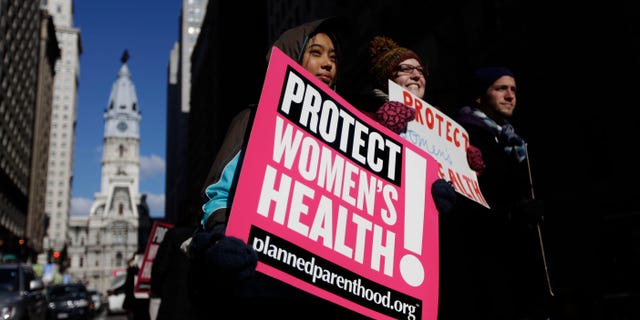
Dr. Rebecca Gomperts discusses abortion pills with a Northern Ireland police inspector on May 31, 2018. Photo credit: David Young/PA Wire (Press Association via AP Images)
Across the nation, women’s access to reproductive care has been protested, shuttered, legislated and sometimes strictly limited. So much so that an international organization has stepped in to provide abortion consultations and medications to women who face high barriers to care.
AidAccess was recently founded by Dutch doctor Rebecca Gomperts to provide American women with access to abortion medication. The contentious program operates online, and offers women consultations and mail-delivered abortion medication.
The legality of AidAccess is still undefined. The FDA has said it is investigating the program for any potential legal violations. Currently, the administration mandates that mifepristone, one of the two drugs necessary for a successful medical abortion, must be sold through a tightly-controlled distribution channel.
The Risk Evaluation and Mitigation Strategy (REMS) employed by the FDA on mifepristone bars the sale of the drug online or through retail pharmacies. Advocates for abortion access argue that REMS is typically used for drugs much more dangerous than abortion pills.
Studies on the abortion pill cocktail found that it was overwhelmingly effective and exceedingly safe. A 2017 study published in the Obstetrics and Gynecology medical journal found that of over 8,700 patients who obtained abortion pills through telemedicine services, only .18 percent of them had any complications – none of which resulted in death or even surgery.
Women in the United States have had trouble accessing telemedicine abortion services that competently meet their care needs. Abigail Aiken, an assistant professor at the LBJ School of Public Affairs at the University of Texas at Austin, studied online abortion options.
“If you have money and resources, you can access these medications. If you’re a poor woman, you can’t."
Aiken’s work found that many online options either can’t sell the medication online, or if they do, are woefully short on instructions and information. She said women turn to online options for a variety of reasons. Some prefer their privacy, others don’t have access to clinics, and some face financial and logistic limitations to meeting their state’s requirements for a legal abortion.
“From a public health perspective, there is a harm-reduction justification for helping people to avoid resorting to ineffective or unsafe abortion methods,” she wrote in the study.
Particularly at risk for unsafe self-managed abortions are economically and geographically marginalized women. In this sense, she said she has noticed parallels between her research on abortion access in Ireland and in the United States.
“The actual options available to people in the two countries are strikingly similar,” Aikens said. “That problem of access continues.”
She said the country is effectively living in a post-Roe v. Wade world, where access to abortion care is severely limited for women in much of the country and varies greatly from state to state.
Aiken sees parallels for women in rural Texas or Ireland. She said obtaining a safe abortion in both places often means traveling hours to a clinic and paying hundreds of dollars out-of-pocket. Texas state law doesn’t allow the use of Medicaid or other public funds to pay for an abortion. A 35-year ban on the procedure was recently overturned by a national referendum in Ireland, and before that, women had to leave the country to terminate an unwanted pregnancy.
This gap in access and affordability is what Gomperts and her multiple abortion care services aim to fill. In the United States, women can obtain consultation and, after a screening process, abortion medication for just $95.
Gomperts could not be reached for comment, but she detailed her new efforts in a recent story in The Atlantic, which reported AidAccess had already served some 600 American women.
Gomperts’ first foray into medical care activism came nearly two decades ago. In 1999, she founded Women on Waves, which sailed international waters on a Greenpeace ship providing women with access to reproductive care, abortion education and services – all while skirting local laws.

Abortion rights advocates Grace Fried, center, Claire Roden and David Tuke demonstrate in view of Philadelphia City Hall Friday, Jan. 21, 2011 on the eve of the anniversary of the 1973 Roe v. Wade Supreme Court decision that legalized abortion. (AP)
That venture pushed Gomperts to found Women on Web, an online service for women seeking abortion medication nearly anywhere on the planet – except the United States. The Dutch doctor worried that serving American patients through Women on Web would jeopardize the entire operation. Instead of taking the risk, she started AidAccess.
Aiken said Gomperts’ organizations provide women with the correct doses, proper instructions, warnings and appropriate after-care procedures to safely self-manage their abortions at home.
Of course, not everyone is satisfied with the efforts. Eric Scheidler, the executive director of the Pro-Life Action League, said the program poses problems for women.
“Telemedicine abortions are kind of more sinister in some ways,” Scheidler said. “They make every location in the world effectively an abortion scene.”
His organization, which primarily focuses its efforts on “public square” advocacy, is staunchly opposed to any kind of abortion. He took issue with arguments that AidAccess helps with issues of the accessibility and affordability of reproductive care.
“I don’t see this falling under the same banner of making healthcare more affordable, because having an abortion isn’t healthcare,” he said.
Aiken’s research shows that the reasons for women seeking a self-managed medical abortion are as myriad as the women themselves. Beyond their choices, she said programs like AidAccess provide an unmistakable benefit for marginalized women who have trouble overcoming the barriers to access.
“If you have money and resources, you can access these medications,” Aiken said. “If you’re a poor woman, you can’t. … AidAccess is trying to provide a way for women to do this at home.”
Source: Read Full Article